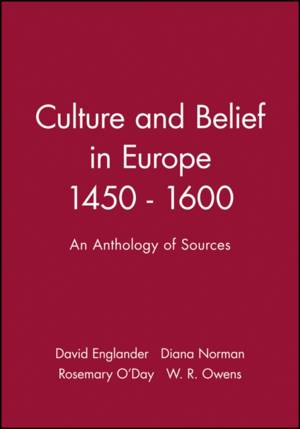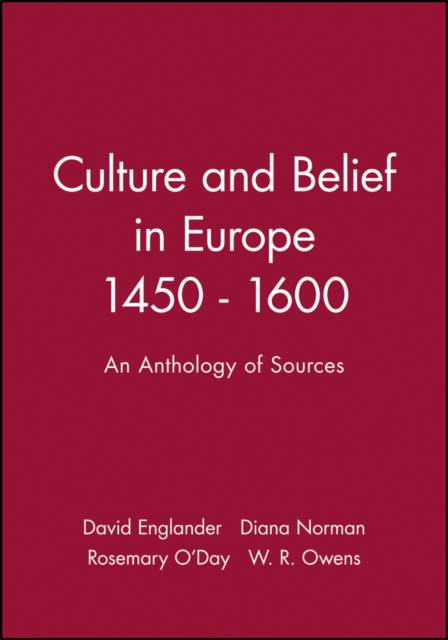
- Afhalen na 1 uur in een winkel met voorraad
- Gratis thuislevering in België vanaf € 30
- Ruim aanbod met 7 miljoen producten
- Afhalen na 1 uur in een winkel met voorraad
- Gratis thuislevering in België vanaf € 30
- Ruim aanbod met 7 miljoen producten
Zoeken
Culture and Belief in Europe 1450 - 1600
An Anthology of Sources
David Englander, Diana Norman, Rosemary O'Day, W R Owens
Paperback | Engels
€ 132,45
+ 264 punten
Omschrijving
This open university reader is a wide-ranging interdisciplinary collection of material from primary sources, illustrating the relationship between cultural change and religious belief in sixteenth-century Europe. It contains more than eighty extracts drawn from a variety of genres including political, religious, philosophical and legal writing, diaries, letters, plays, poems and fiction. Some have never previously been published, others have not been reprinted since their original appearance in the sixteenth century, and a number are translated into modern English for the first time.
`Culture and Belief in Europe 1450 - 1600' includes writing from such renowned thinkers as Erasmus, Luther, Machiavelli, and Sir Thomas More, besides that of lesser-known authors. Works of literature also feature extensively, and writings from Cervantes, Rabelais, Edmund Spenser, and Sir Philip Sidney amongst many others are all to be found here.
A general introduction describes the anthology's central aim - to explore aspects of the interrelationship between the politics, religion and writing of the period. The book is divided into eight thematic sections.
Spelling in the extracts has been sensitively modernized throughout, and the editors provide a headnote and appropriate explanatory annotation for each item.
`Culture and Belief in Europe 1450 - 1600' includes writing from such renowned thinkers as Erasmus, Luther, Machiavelli, and Sir Thomas More, besides that of lesser-known authors. Works of literature also feature extensively, and writings from Cervantes, Rabelais, Edmund Spenser, and Sir Philip Sidney amongst many others are all to be found here.
A general introduction describes the anthology's central aim - to explore aspects of the interrelationship between the politics, religion and writing of the period. The book is divided into eight thematic sections.
Spelling in the extracts has been sensitively modernized throughout, and the editors provide a headnote and appropriate explanatory annotation for each item.
Specificaties
Betrokkenen
- Auteur(s):
- Uitgeverij:
Inhoud
- Aantal bladzijden:
- 508
- Taal:
- Engels
Eigenschappen
- Productcode (EAN):
- 9780631169918
- Verschijningsdatum:
- 8/01/1991
- Uitvoering:
- Paperback
- Formaat:
- Trade paperback (VS)
- Afmetingen:
- 152 mm x 227 mm
- Gewicht:
- 707 g

Alleen bij Standaard Boekhandel
+ 264 punten op je klantenkaart van Standaard Boekhandel
Beoordelingen
We publiceren alleen reviews die voldoen aan de voorwaarden voor reviews. Bekijk onze voorwaarden voor reviews.











